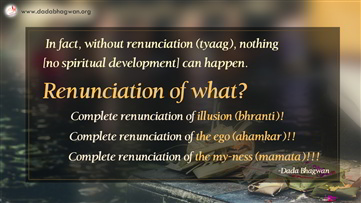Spiritual Quotes On renunciation
The One whose ego (ahamkar) and my-ness (mamata) go away completely, is considered a complete tyaagi (one who has renounced worldly life).
Param Pujya Dada BhagwanYou will have to suffer the consequences of all that you renounce. Is it in our control to renounce (tyaag)? Is it in our control to acquire (grahan)? That is actually dependent upon one's merit-demerit karma (punya-paap)!
Param Pujya Dada BhagwanYou do not have to renounce anything. The path of liberation is not one of acquisition or renunciation at all. Acquisition and renunciation are actually a part of the auspicious and inauspicious path. This [Akram Science] is actually the path to liberation; it is the path of [attaining] the absolute state of the Self (Parmatma pad). One only has to understand it.
Param Pujya Dada BhagwanThe fruit [result] of renunciation is not liberation, the fruit of Knowledge of the Self is liberation.
Param Pujya Dada BhagwanThe only difference between a Gnani and a renunciate is that the Gnani prevails in a state of saiyam (absence of anger-pride-deceit-greed and attachment-abhorrence), whereas a renunciate follows a set discipline. No one besides a Gnani can remain in saiyam.
Param Pujya Dada BhagwanRenunciation and saiyam are two different things. Renunciation is where one gives up all marital ties, parental ties, financial ties and material possessions. What is saiyam? When anger, pride, deceit, greed and attachment-abhorence are under control, then it is considered as saiyam.
Param Pujya Dada Bhagwansubscribe your email for our latest news and events














